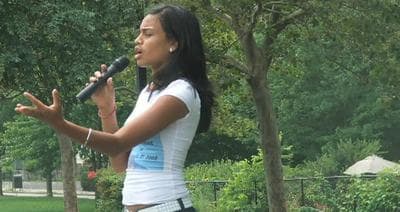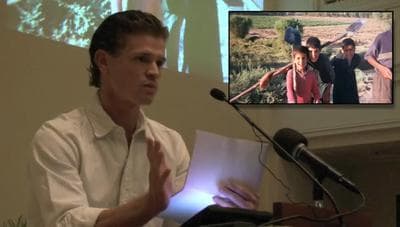Advertisement
Profiles Of Extraordinary Graduates: Beatriz Rivera & Ross Caputi
Thousands of college seniors around Boston, and thousands more around Massachusetts, graduate this month and go into the world. This Friday and next, WBUR profiled a few of those seniors whose stories we found remarkable. In our first of two reports, we meet Beatriz Rivera, a youth activist, and Ross Caputi, an Iraq war veteran who is now outspoken in the anti-war movement.
BEATRIZ RIVERA, 22, JAMAICA PLAIN
Pine Manor College, Major: Social and Political Systems

The Streets To The State House
When Beatriz Rivera was still in middle school, she started to get involved with girl gangs. She said those friendships gave her a stability she wasn't getting at home.
"At the time, we were a family around my neighborhood," she said. "That's all we had was each other. So it was more because I was angry, it was more because I was misunderstood."
When she was 14 years old, Beatriz's parents separated and her father moved out of the house. Beatriz's mother was left to take care of the six kids, the youngest being Beatriz.
"Through those years, those primary years, my family broke apart," she said. "My brother got into his own gangs. He also got locked up, he did prison time most of that time, so I was separated from him — that was my closest brother, we're only two years apart."
She says it was those experiences that made her angry and made it hard to stay on a good path.
Advertisement
"Do you work on your math homework or do you work on the situations that are happening on the streets, where a young person from your neighborhood is getting killed, you know, every other day?" Beatriz asked. "And these are people that you know, it's not people far from you. So it's just that anger build up, it's almost feeling like you don't have any hope to get out of that."
But, just in time, a community program in Jamaica Plain called Spontaneous Celebrations reached out to Beatriz. They got her involved in social justice and they also got her involved in the arts. She fell in love with dancing — and stilt walking, of all things — and spent less time on the street.
When Beatriz was becoming too old for the program, she and a group of 10 of her friends decided to start their own organization, by youth and for youth, to keep themselves and other kids off the street. They called it the Beantown Society and became its youth leaders.
"This now became a home for us and we wanted to get other young people — other brothers, our siblings, our cousins, people around our neighborhood — just as much as involved as we are," Beatriz said. "So we now work with our own friends."
'Wisdom Is Power'
Beatriz never really imagined that she would go to college. No one in her family ever had before and she wanted to keep doing the work she was doing with kids on the streets.
But in the end, she decided to go to Pine Manor, a small, all-women's college in Chestnut Hill, not so much because she wanted to but because she felt she needed to.
"I just feel like in life, the way that it's set up now is, wisdom is power," she said. "As a community organizer I have a lot of experience, but I need to balance it off in knowing. I'm passionate about social justice issues. If I find an issue and we take it to the State House, they're not going to hear us just talking and wanting to protest or rally. They want to see something on paper, they want to see facts — and put into words what exactly I was living."
In other words, to give a voice to people like her. That's something Beatriz thinks the young people she works with are missing, the feeling that they are powerful and that their voices matter. Which is why she plans to become a state senator.
"I feel like there needs to be a voice inside inside of the State House that comes from the community, we need a voice from the streets and I think I bring that," she said.
She recently interned for state Sen. Sonia Chang-Diaz, who she calls a role model because she is a Latina woman doing the work that Beatriz soon wants to do.
On May 15, Beatriz delivered the commencement speech at her graduation from Pine Manor, making her the first member of her family to graduate college. Her whole family was there, including her father, who moved back in with the family when Beatriz was 18. She says they are working on rebuilding their relationship.
Her brother, the one who served time in prison, is out and now works alongside Beatriz at the Beantown Society. She says her brother started to turn his life around after their mom sent him a newspaper clipping while he was in prison of Beatriz at a protest.
Beatriz says she has already received multiple job offers, but she hasn't made up her mind yet. What she does know is that she wants to continue working with young people as a mentor and role model.
"It's important for me to stay in Boston," she said. "I can't imagine myself going anywhere else. But if I do go anywhere else, it's obviously to get experience and bring it back to my hometown."
ROSS CAPUTI, 26, FITCHBURG
Boston University, Major: Linguistics

Rethinking Everything
After graduating from Leominster High School, Ross Caputi joined the U.S. Marines because he figured it was either that or continue landscaping for the rest of his life. He was shipped to Iraq, where he participated in the Second Battle of Fallujah, a siege the U.S. military has called some of the heaviest urban combat Marines have been involved in since Vietnam. The battle changed his life.
"They said that this was a good, noble cause and we were heroes for doing this and this was going to usher in freedom and democracy to Iraq," he said. "In reality, we forced nearly the entire population of Fallujah to go live out in the desert. The people who stayed in to resist, we killed them. And we demolished a lot of the city. We used bulldozers and bulldozed entire neighborhoods."
Ross became openly critical of the military and openly disrespectful toward his superiors. "The hypocrisy of all of this, to say that we are doing this for a liberation, to do this for democracy, and we're doing this for the people of Fallujah, just made me rethink everything," he said.
About a year after returning home from Iraq, Ross says he was discharged from the Marines for what the military called a personality disorder. "I forget the way that they defined it, but a personality type not fit for military service, something like that," he said. "It kind of just seemed like a way of cutting their losses with me. I wasn't going to get an honorable discharge, I wasn't going to get the GI Bill, but it wasn't necessarily like a mark on my record."
Ross moved home and started school at Fitchburg State College. But he couldn't handle the handshakes and backslaps and free beers from everyone who wanted to thank him for his service.
"Just in the back of my head, I'm like, you do not understand, you have no idea what you are thanking me for," he said. "So I had to get out."
He moved to Italy to do a study abroad program and ended up spending a year and a half there, doing a lot of reading on U.S. foreign policy and the history of the Marines and of American imperialism. He was particularly affected by the works of Howard Zinn and Noam Chomsky and decided he needed to come back to the U.S. to share his experiences through writing and speaking.
"But with a high-school education from Leominster High School, I wasn't a very a strong writer, certainly wasn't a good public speaker," he said, "so I felt like I needed to get some skills to be able to do that — I wanted to learn how to write, mostly."
A Tough Transition
Ross transferred to BU and started his first semester there in fall 2008. Having been out of school for so many years, and with the experiences he'd had during that time, it wasn't an easy transition.
"It was hard because I didn't remember anything I'd learned in high school, all these things that should be your tools in college, I didn't have them so I had to relearn all of them," he said. "And it was also because Iraq and Fallujah and all this, this is stuff that kind of sticks in your mind and it's in your mind all day long. So it's tough to read about mundane things like grammar while you have all that playing in the back of your head."
Ross became active in the anti-war movement on campus. He says he was the only veteran involved with those organizations at BU and one of the very few in Boston. "I think generally it's much easier for veterans to let everyone treat them like heroes and to collect their benefits from the VA and let that be a stepping stone for them to move on with their life," he said.
He says his outspoken opposition to the war has angered many of the men from his old unit. "They call me a traitor and some even go as far as to say that I'm a terrorist or I'm supporting terrorists, sympathizing with terrorists," he said.
But Ross says he feels like he has no choice but to speak out. "I would love to go somewhere and be a farmer," he said. "But I'm seriously worried about the world that my children are going to be living in. So I feel like I need to do this for them."
Ross graduates on May 22 from Boston University with a degree in linguistics. He's not planning to attend the ceremony. He wants to write a book about his experiences and just last month he married an Iraqi-American woman he met at an anti-war conference. They live together in Fitchburg.
Next week, WBUR's profiles of graduating seniors continues with the story of a chance encounter in a Holyoke gas station that turned a young man's life around.
This program aired on May 20, 2011.